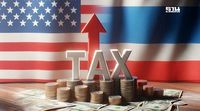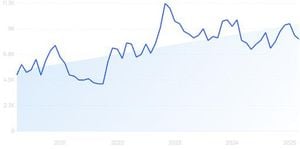In a significant move that could reshape trade dynamics, former U.S. President Donald Trump has announced a substantial increase in import tariffs on goods from several countries, including Thailand. Effective April 2, 2025, the U.S. will impose a base import tariff of 10% on all imports, with Thailand facing an even steeper increase of 37% due to its trade surplus with the U.S. This measure is part of Trump's broader strategy to address trade imbalances and boost the American economy.
Commerce Minister Phairat Phongthitthanon, in a statement on April 3, 2025, acknowledged the necessity of tariffs in recalibrating trade relationships with partner countries. "The Thai government recognizes and understands the importance of the U.S. needing to adjust trade balances with many partners through reciprocal tariffs," he said. The Thai government is already in discussions to address these new tariffs and their implications.
Trump's announcement, which he dubbed the "Day of Economic Independence for America," has raised alarms among Thai exporters. The new tariffs will apply to a wide range of goods, with the potential to significantly impact Thailand's economy, which heavily relies on exports to the U.S. In 2024, Thailand's exports to the U.S. accounted for 10.6% of its total exports, with key products including computer parts, broadcasting equipment, and automobiles.
According to the Office of Commercial Affairs of the Thai Embassy in Washington, D.C., Thailand's exports to the U.S. are valued at approximately $48.7 billion. However, the newly imposed tariffs could drastically reduce this figure. The Thai economy could face a downturn, with estimates suggesting that if the tariffs remain at 37%, Thailand's GDP growth could plummet from an expected 2.5% to as low as -1.1% this year, as per Dr. Piyushak Chantarat, head of economic analysis at Phatra Securities.
Dr. Piyushak elaborated that the repercussions of the tariffs would be felt across various sectors. "If the tariffs increase by 10%, our export sector could decrease by -3%, compared to a previous projection of -5%. The overall GDP growth could potentially increase from 1.7% to 2.5% if we manage the situation effectively," he said.
The situation is further complicated by the fact that Thailand's agricultural imports are also subject to high tariffs from the U.S., with some products facing rates as high as 42%. For instance, wheat is taxed at 27%, dairy products at 40%, and animal feed at a staggering 260%. These tariffs not only threaten Thailand's agricultural exports but also raise concerns about food prices domestically.
Mr. Prakit Siriwattanaket, Managing Director of Principal Asset Management Co., Ltd., pointed out that the rationale behind the high tariffs on Thailand is rooted in the trade surplus the country enjoys with the U.S., which was approximately $35.4 billion in 2024. He noted, "Trump's claim that Thailand imposes tariffs as high as 72% on U.S. goods is misleading and does not apply to all categories of products. The actual increase of 36% in tariffs is expected to have a detrimental effect on Thailand's GDP."
As the situation unfolds, the Thai government is urged to engage in negotiations with the U.S. to mitigate the impacts of these tariffs. "We need to act quickly and decisively in our negotiations with the U.S. market, which is our largest export destination," said Mr. Kongsit Chantrik, Executive Director of the Thai National Shippers' Council. He emphasized that the longer Thailand waits to adjust its trade policies, the more severe the consequences will be.
In light of these developments, the Thai government is considering various strategies to counter the impact of the tariffs. Suggestions include lowering import tariffs on U.S. goods to enhance competitiveness and seeking new markets to diversify Thailand's export base. Dr. Piyushak noted that the average tariff Thailand imposes on U.S. goods is around 8%, compared to the 2% tariff the U.S. imposes on Thai goods. This disparity presents an opportunity for Thailand to negotiate better terms.
Moreover, the Thai government is expected to explore partnerships with other countries facing similar tariff increases, aiming to create a united front in negotiations with the U.S. This approach could help Thailand maintain its export volume and stabilize its economy amidst rising global uncertainties.
While the immediate focus is on negotiating with the U.S., the broader implications of these tariffs could lead to a ripple effect in the global economy. As the U.S. imposes higher tariffs, prices for imported goods are likely to rise, leading to inflationary pressures that could dampen consumer spending. This, in turn, could affect Thailand's exports, as U.S. consumers may opt for domestically produced goods over imports.
Experts warn that the increased tariffs could lead to a decrease in foreign investment in Thailand, as companies reassess their production and supply chain strategies in light of higher costs. The uncertainty surrounding U.S. trade policy may compel some businesses to relocate their operations to countries with more favorable trade conditions.
As the April 9 deadline for implementing these tariffs approaches, the Thai government must act swiftly to protect its economic interests. The potential for a trade war looms large, and the stakes are high for both Thailand and the U.S. As negotiations commence, the hope is that both nations can find a path forward that mitigates the adverse effects of these new tariffs.
In summary, the new import tariffs announced by Donald Trump pose a significant challenge for Thailand, impacting its economy and trade relations. The Thai government is faced with the urgent task of negotiating with the U.S. to alleviate the burden of these tariffs while simultaneously exploring new markets and adjusting domestic policies to ensure economic stability.





